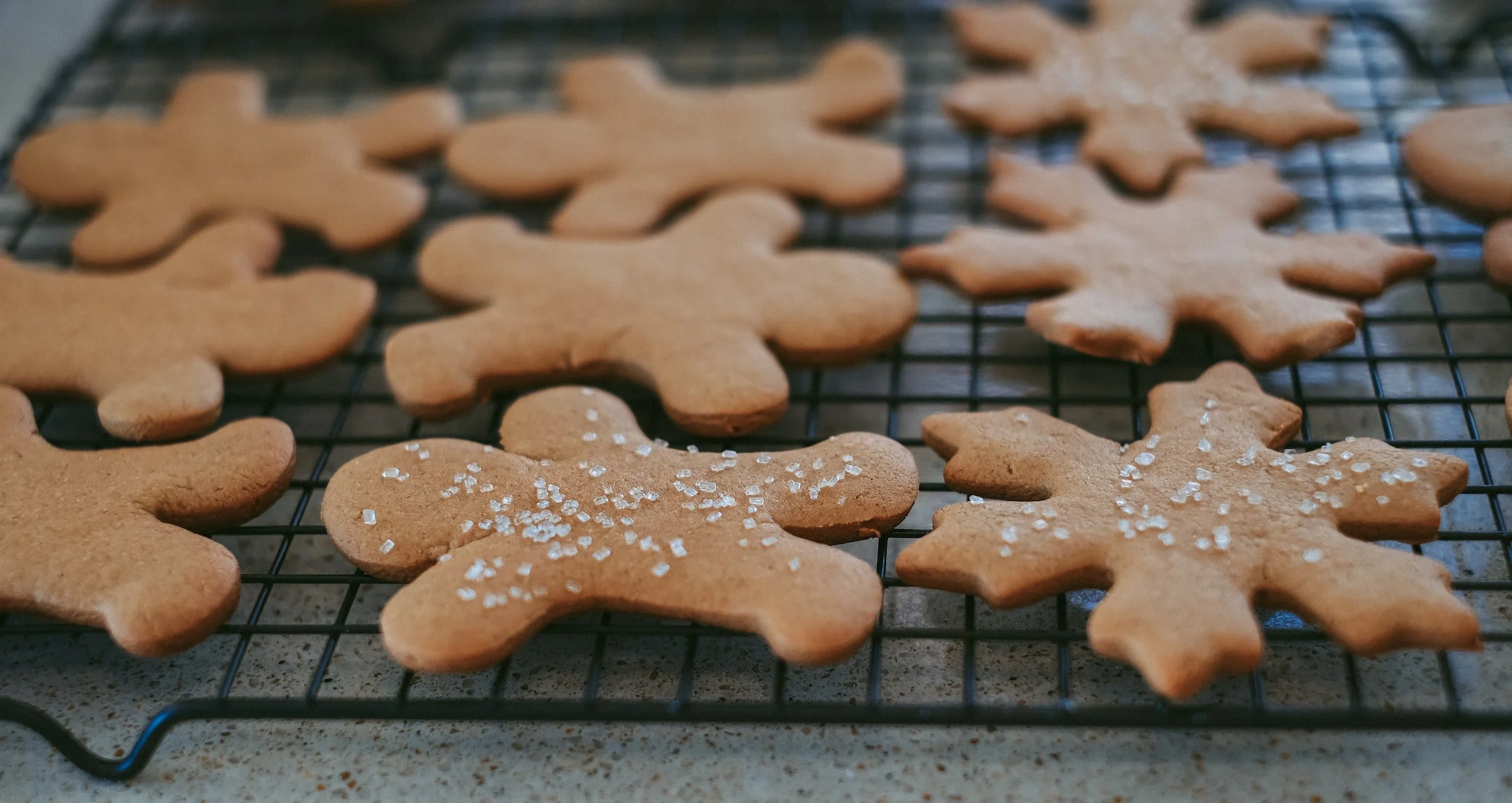Holiday Health Edition
The holidays come with many additional demands on our time. The social events, the kid holiday commitments, work demands, and the driving!...all take away from precious time we have to prioritize and support our health. Here are some of the tips I use to help navigate the holidays in a joyful, fun, and healthy way and also protect from unhealthy metabolic and gut consequences.
We will discuss how to:
Cope with stress.
Prioritize fiber and hydration for good motility and satiety.
Balance blood sugar.
Minimize alcohol.
Cope with Stress
The holiday season can bring up a lot of feelings and emotions - and not all positive. Whether it be fielding comments from family members, the mountain-high to-do list, financial pressures, missing loved ones, food stressors, or dread over the emotional and mental turmoil that this all involves — it can be a lot.
Here are a few ways you can help cope with worry over the holidays:
Support your nervous system through practices like breathwork, journaling, going for a walk, and spending time outside. Schedule time in your calendar to slow down. I practice this by scheduling an hour of self-care every Friday, whether it be a walk with a friend, a manicure, acupuncture, or simply playing ball with my pup.
Have a compassionate conversation with yourself. Finding an ounce of compassion and grace for you can help this time feel less heavy. Evaluate your expectations. Are they realistic? Right down two goals for yourself this season (not goals for your family or kids…PERSONAL goals). Practice self-love by finding ways to prioritize your goals.
Lean on a trusted someone, a therapist, a loved one, a partner, or a friend, for support. Social isolation and loneliness can have serious health consequences.
Prioritize sleep. A lack of sleep increases distress and the release of stress hormones like cortisol. In addition, research shows that sleep deprivation keeps the amygdala, our emotional processor in the brain, in a heightened state of activation, increasing anxiety, and decreasing emotional regulation.
Prioritize Fiber and Hydration
When we're eating foods that are out of our norm, traveling, or out of our routine, bloating and constipation is more likely. Who has time to deal with that over the holidays?
Make it a priority to keep your fiber and hydration habits strong. Prioritize plants with every meal. Fiber not only moves things along, but it also keeps us full for longer…key during a time when overeating is customary. If you have less control because you're staying with family or traveling, try to bring along some ground flax or chia seed, or Sunfiber, my favorite tasteless fiber, that you can sprinkle on salads, soups, or add to smoothies for some extra fiber.
Be mindful that caffeine and alcohol increase dehydration. Focus on hydrating more than normal between meals and the first thing when we wake up in the morning. Consider a daily electrolyte supplement to ensure adequate mineral balance for hydration. LMNT and Ultima are two of my favorites.
If constipation persists, Magnesium Citrate and Vitamin C are helpful supplements in moving things along. Check out my Fullscript portal for quality pharmaceutical-grade recommendations at 20% off retail prices. As always, consult a healthcare professional before adding any supplement to your daily routine.
Balance your Blood Sugar for Energy
There are ways to incorporate holiday treats to help you feel better throughout the holidays without entirely avoiding or limiting them.
When we overconsume foods that are higher in sugar and carbohydrates or consume them alone without fat, fiber, and protein, blood sugar levels spike, followed by a significant blood sugar drop (hypoglycemia). If we experience many of these blood spikes and dips throughout the day, we may feel an impact on overall energy levels, digestion, hormones, and mental health.
To help keep your blood sugar levels balanced over the holidays, here are a few recommendations:
Eat your protein and veggies first during your meals, and save the holiday sweets for dessert immediately after dinner. Don’t wait too long as we want the fat, protein, and fiber from dinner to help us slower digest the sugary dessert.
Avoid eating your holiday treats on their own. My motto is “No naked carbs!” Either have them at the end of a meal, like mentioned above, or pair them with protein, fat, and fiber. Dark chocolate and almond butter are a better choice metabolically than chocolate alone.
Move after meals. A 10-15 minute walk immediately after eating can help lower blood sugar.
Minimize Alcohol
Let’s be clear - any amount of alcohol isn't healthy. One glass of wine daily for women and two for men is considered MODERATE drinking. Moderate alcohol levels have been shown to decrease brain cells, increase the risk for dementia and shrink the volume of the hippocampus in our brain, which has a major role in learning and memory. These are just a few examples of the negative effects of alcohol on the brain. In addition to increased disease risks like cancer, there are numerous ramifications for the gut, hormones, kidneys, liver, and pancreas.
Minimizing alcohol intake is possible over the holidays too. Here are some surefire tips:
Plan for events during the week where you plan to drink alcohol. Avoid the glass of wine or alcoholic beverage that doesn’t matter much to you. I prefer to drink my favorite wine at home on my sofa by the fire over a social event. For others, parties may be the preferred option.
Find non-alcoholic options you enjoy. Two of my favorites are kombucha cut with sparkling water or Hoplark Hoptea.
On nights you plan to drink, think about how many drinks you plan to consume and stick to your goal.
Drink water or club soda with lime in between each alcoholic beverage to stay hydrated.
Stop drinking later in the evening to minimize the impact on your sleep.
NOTHING is 100% perfect during the holidays. My hope is that these tips help you navigate through the chaos with a bit more stability and satisfaction for feeling well and meeting your health goals. What’s most important is that when plans are derailed, which they will be!, meet yourself with grace and compassion, and pick yourself back up again.
Have a wonderful holiday, and thank you so much for being here.
Need extra support for your health goals? Here at GreenMind, we offer science-based, functional health guidance and personalized treatments to help you thrive and reach your personal health goals. CONTACT US today for a consult!
As an affiliate, I earn from qualifying purchases.
References:
Alcohol and cancer risk fact sheet. National Cancer Institute. (n.d.). Retrieved December 10, 2022, from https://www.cancer.gov/about-cancer/causes-prevention/risk/alcohol/alcohol-fact-sheet#what-is-the-evidence-that-alcohol-drinking-can-cause-cancer
Topiwala, A., Allan, C. L., Valkanova, V., Zsoldos, E., Filippini, N., Sexton, C., Mahmood, A., Fooks, P., Singh-Manoux, A., Mackay, C. E., Kivimäki, M., & Ebmeier, K. P. (2017). Moderate alcohol consumption as risk factor for adverse brain outcomes and cognitive decline: Longitudinal cohort study. BMJ, 357. https://doi.org/10.1136/bmj.j2353
Yoo, S.-S., Gujar, N., Hu, P., Jolesz, F. A., & Walker, M. P. (2007). The human emotional brain without sleep—A prefrontal amygdala disconnect. Current Biology, 17(20), R877–R878. https://doi.org/10.1016/j.cub.2007.08.007





